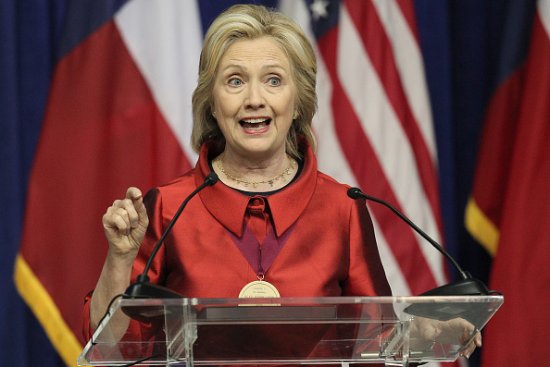
Nearly all of it was spent against Hillary Clinton
The 2016 presidential election has already unleashed more than $1 million in negative ads, according to a Center for Public Integrity review of federal campaign finance filings.
Only 515 more days until Election Day. In the meantime, expect the price of presidential mudslinging to rapidly hit eight, then eventually nine figures, as the already crowded race for the White House escalates.
To date, nearly all of the negativity has been directed at Democratic Party frontrunner Hillary Clinton, who announced her candidacy in mid-April.
This month alone, Clinton has been attacked by the Republican National Committee and a host of other conservative groups, including the Stop Hillary PAC and the Citizens United Super PAC.
“Getting in early was the only way to go given the enormity of the opposition,” said Dan Backer, treasurer of the Stop Hillary PAC.
“That strategic move will ultimately help defeat her,” Backer continued. “A lot of groups have recognized the coming storm and are getting themselves and their audiences ready.”
Clinton campaign staffers did not immediately respond to a request for comment, although Clinton supporters have launched a massive, rapid-response operation called Correct the Record.
And other left-leaning political groups, including the Democratic National Committee, have turned Clinton’s embattlement into fundraising opportunities of their own.
Johanna Dunaway, an associate professor of political science and mass communication at Louisiana State University, said early advertisements are important for several reasons, including fundraising and establishing a candidate’s reputation.
“Early ads are critical to defining candidates and what they are all about — from their personal bio to their policy positions,” she said.
So far, just one Republican candidate — former Arkansas Gov. Mike Huckabee — has been targeted by attack ads, according to reports filed with the Federal Election Commission by party committees, nonprofits, political action committees and super PACs.
Not captured by these reports: so-called “issue ads” that cast candidates and their policy positions in a negative light that are not disclosed to federal election regulators this early in the campaign process.
Huckabee has witnessed about $100,000 spent against him so far — all by the conservative Club for Growth, an anti-tax organization that has played a prominent role in the careers of several of Huckabee’s Republican rivals, including Sens. Ted Cruz, Rand Paul and Marco Rubio.
Earlier this year, David McIntosh, president of the Club for Growth, warned that his group would “make sure that Republican primary voters thoroughly examine [Huckabee’s] exceptionally poor record.”
In an email, Club for Growth spokesman Doug Sachtleben stressed that the Club for Growth had not officially endorsed anyone in the race but praised Cruz, Paul and Rubio for having “walked the talk.”
Huckabee has long feuded with the Club for Growth, which he says has “utterly misrepresented, distorted and outright lied” about his record as governor.
Huckabee could also face trouble from a new super PAC, Truth Squad 2016, which was formed this week by 2012 Republican presidential also-ran Fred Karger. The committee’s organizational paperwork specifically names Huckabee as a candidate it exists to oppose.
Some political groups, however, are opting to introduce their preferred candidates in a positive light.
Paul, the libertarian-leaning senator from Kentucky, for instance, has benefited from super PAC Concerned Voters for America spending more than $250,000 on field organizers to promote his campaign.
Concerned Voters for America has, in the past, received the bulk of its funding from a nonprofit organization that grew out of the failed 2008 presidential campaign of his father, former Republican Rep. Ron Paul of Texas.
Meanwhile, Rick Perry, the former governor of Texas who announced his presidential run on June 4, has been praised in more than $200,000 worth of TV ads in Iowa this month by a supportive super PAC called the Opportunity and Freedom PAC.
Jordan Russell, a spokesman for the group, said the ad buy was a “chance to reintroduce Gov. Perry’s record to voters” and was a way to help Perry “build momentum.”
Furthermore, Cruz, the Texas senator beloved by many tea party activists, has been lauded to the tune of about $50,000 to date by a political action committee called Make DC Listen, a name that stems from a popular phrase in his speeches.
Make DC Listen is led by John Drogin, who managed Cruz’s 2012 U.S. Senate campaign, when he unexpectedly prevailed over GOP establishment favorite David Dewhurst.
Overall, groups not controlled by the candidates have spent about half as much on positive ads so far this year — roughly $575,000 — as negative ones, according to the Center for Public Integrity’s analysis.
Most presidential candidates will file their first campaign finance reports with the FEC next month.